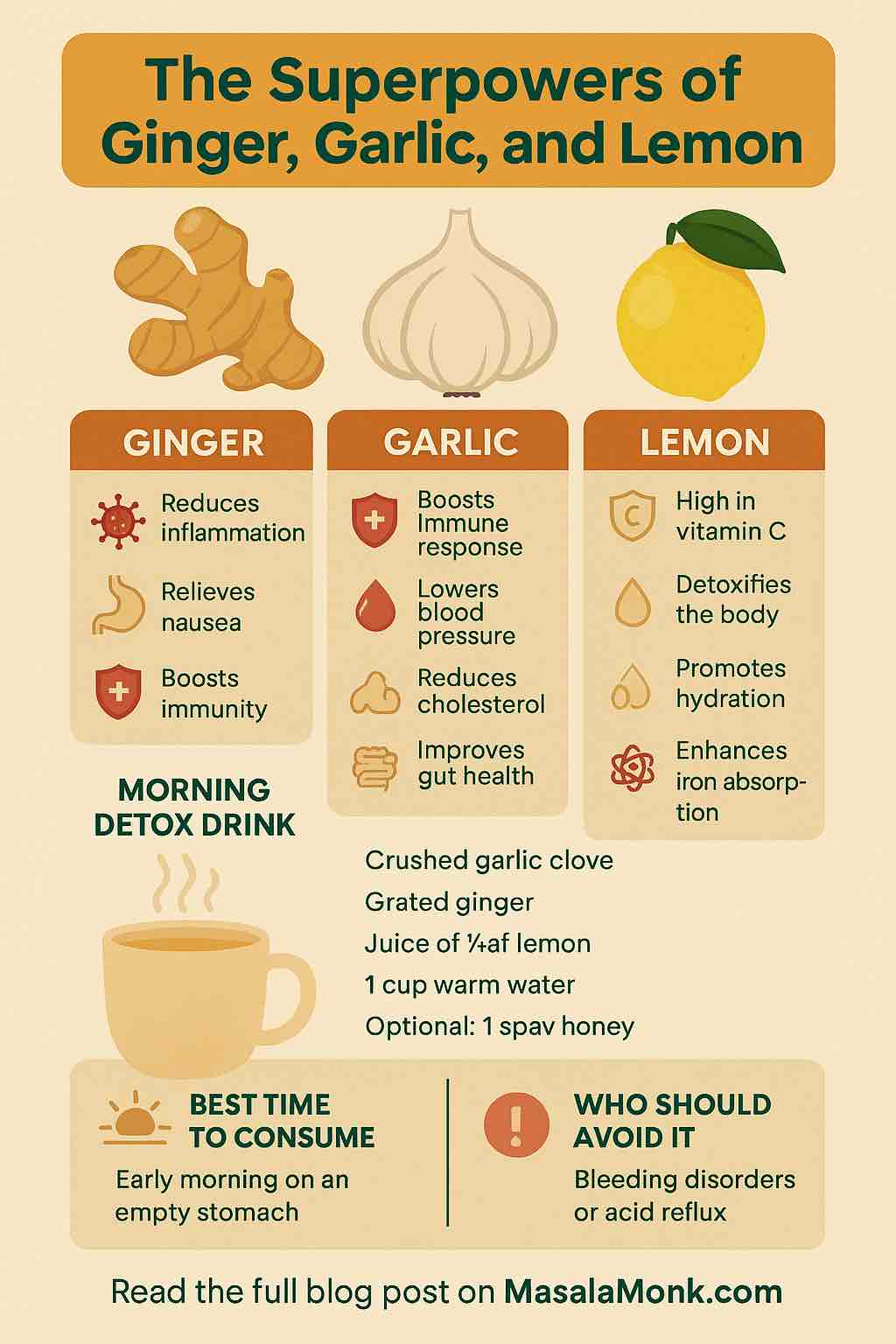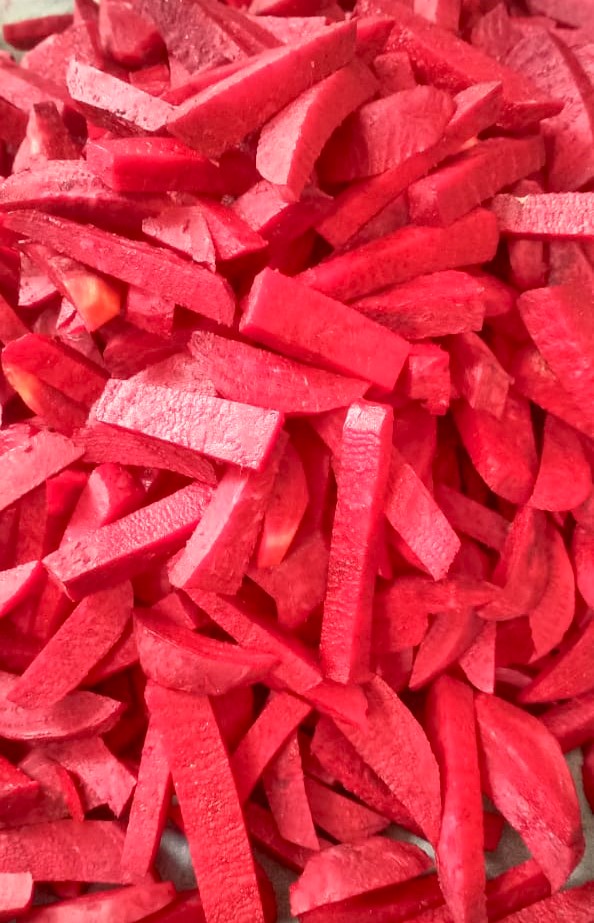
In the world of natural wellness, few combinations are as revered and time-tested as ginger, garlic, and lemon. These three powerhouse ingredients are more than just kitchen staples—they’re natural allies in supporting immunity, improving digestion, combating inflammation, and promoting overall health.
From Ayurvedic medicine to modern clinical studies, the benefits of this trio continue to be validated by science. In this blog post, we explore how each ingredient contributes to your health, the synergy they create when combined, and how to integrate them easily into your daily life.
🧄 The Immunity Boosting Power of Garlic
Garlic has long been known as nature’s antibiotic. Its active compound, allicin, is responsible for much of its medicinal power.
✅ Health Benefits of Garlic:
- Boosts immune response: Studies show that garlic may reduce the severity and duration of common colds and infections.
- Lowers blood pressure: Garlic supplements can help reduce systolic and diastolic blood pressure, especially in hypertensive individuals.
- Reduces cholesterol: Garlic may help reduce LDL (bad) cholesterol while maintaining HDL (good) cholesterol.
- Anti-cancer potential: Some studies have linked garlic consumption with a reduced risk of certain cancers, including colorectal and stomach cancers.
- Improves gut health: Its antimicrobial properties help in maintaining a balanced gut microbiome.
🔍 Recent Study: A 2024 review published in Frontiers in Nutrition confirmed garlic’s immune-boosting properties and potential role in metabolic health.
🌿 Ginger: Nature’s Anti-Inflammatory and Digestive Aid
Ginger, with its sharp flavor and warmth, is a versatile root that has been used for centuries in both Eastern and Western natural medicine.
✅ Health Benefits of Ginger:
- Reduces inflammation: Its bioactive compound gingerol has powerful anti-inflammatory and antioxidant effects.
- Relieves nausea and indigestion: Ginger is well-known for reducing nausea—especially during pregnancy and chemotherapy—and improving digestion.
- Boosts immunity: Ginger helps modulate immune responses and combat oxidative stress.
- Supports metabolic health: Ginger may help lower blood sugar and improve markers of metabolic syndrome.
- Improves circulation: Its warming properties promote better blood flow and cardiovascular health.
💡 Fun Fact: Ginger shots have become trendy in wellness circles, offering concentrated doses of antioxidants and immune-enhancing compounds.
🍋 Lemon: A Citrus Superfood for Detox and Immunity
Lemon, rich in vitamin C and flavonoids, is an essential immune-supporting fruit. Its tangy juice not only enhances flavor but also offers numerous health benefits.
✅ Health Benefits of Lemon:
- Vitamin C powerhouse: Essential for white blood cell function and collagen production.
- Detoxifies the body: Lemon water may help support liver function and detoxification.
- Promotes hydration: Adding lemon to water makes it more palatable and encourages better hydration.
- Alkalizing effect: Despite its acidity, lemon has an alkalizing effect on the body once metabolized.
- Enhances iron absorption: Consuming lemon with iron-rich foods improves iron bioavailability.
🧬 Clinical Insight: A 2022 study found that lemon-ginger extracts suppressed cancer cell growth and oxidative stress markers in lab conditions.
🧪 The Synergistic Power of the Trio
When ginger, garlic, and lemon are combined, their benefits amplify. Together, they form a potent natural remedy for immune defense, inflammation reduction, and general vitality.
🌟 Key Synergistic Benefits:
- Stronger immune defense: Each ingredient boosts immune function, but together, they can help strengthen your body’s resistance to viruses and bacteria.
- Antioxidant overload: Rich in compounds that fight oxidative stress and neutralize free radicals.
- Anti-inflammatory blend: Helps alleviate chronic inflammation—a root cause of many modern diseases.
- Digestive aid: Promotes gut health, reduces bloating, and enhances nutrient absorption.
- Cardiovascular support: Helps regulate blood pressure, cholesterol, and blood sugar levels.
🧉 Traditional Wisdom Meets Science: In folk medicine, this trio has been used for centuries to make healing tonics. Science now confirms many of these age-old practices.
🍹 How to Use Ginger, Garlic, and Lemon
🌞 1. Morning Detox Drink
Ingredients:
- 1 garlic clove (crushed)
- 1 tsp grated ginger
- Juice of 1/2 lemon
- 1 cup warm water
- Optional: 1 tsp raw honey
How to make:
Crush garlic and let it sit for 5–10 minutes to activate allicin. Mix with ginger and lemon juice in warm water. Stir and drink on an empty stomach.
🍯 2. Ginger-Garlic-Lemon Immunity Shot
Ingredients:
- 2-inch ginger piece
- 2 garlic cloves
- Juice of 1 lemon
- Dash of turmeric
- Optional: black pepper for absorption
Instructions:
Blend all ingredients with a little water. Strain and drink in small quantities. Store in the fridge for up to 3 days.
🫖 3. Soothing Herbal Tea
Simmer ginger slices and crushed garlic in water for 10 minutes. Add lemon juice and honey before drinking. Great for colds and sore throats.
⚠️ Precautions and Who Should Avoid This Trio
While these ingredients are generally safe, there are a few cautions:
- Pregnancy: High doses of garlic or ginger should be avoided.
- Bleeding disorders: All three can thin the blood—consult your doctor if you’re on anticoagulants.
- Acid reflux: Lemon and ginger may aggravate symptoms in some people.
- Medication interaction: Garlic and ginger may interfere with blood pressure, diabetes, or anticoagulant medications.
💬 Final Thoughts
The combination of ginger, garlic, and lemon isn’t just a folk remedy—it’s a scientifically supported wellness booster. Whether you want to strengthen your immunity, improve digestion, or simply add more nutrient-dense foods to your routine, this trio can be a powerful addition to your daily habits.
🌱 Try incorporating them in your morning routine, soups, teas, or salad dressings. Your body—and your taste buds—will thank you!
🙋♀️ 10 Frequently Asked Questions
1. Can I take ginger, garlic, and lemon every day?
Yes, in moderate amounts. Daily use supports immunity and digestion, but listen to your body and consult your doctor if on medications.
2. What’s the best time to drink the detox drink?
Early morning on an empty stomach helps maximize its effects on metabolism and immunity.
3. Does this trio help with weight loss?
It can support metabolism, reduce bloating, and curb appetite, but it’s not a magic bullet. Pair with healthy habits.
4. Can it cure colds or infections?
It can reduce severity and duration, but it’s not a substitute for medical treatment or antibiotics when necessary.
5. Can I use powdered versions instead of fresh?
Fresh is always better, but high-quality powders can work if fresh ingredients are unavailable.
6. Is it safe during pregnancy?
Consult your healthcare provider. Small culinary amounts are generally safe; supplements or high doses should be avoided.
7. How long should I take this mix?
It can be used daily for general wellness or in short cycles (2–4 weeks) for seasonal immunity boosts.
8. Does it help with cholesterol and blood pressure?
Yes, especially garlic. Multiple studies confirm its benefits for heart health markers.
9. Can I give it to children?
In diluted forms like teas, yes. Avoid strong concentrations or raw garlic for young children.
10. What other ingredients go well with this mix?
Honey, turmeric, black pepper, and cinnamon enhance both taste and health benefits.












